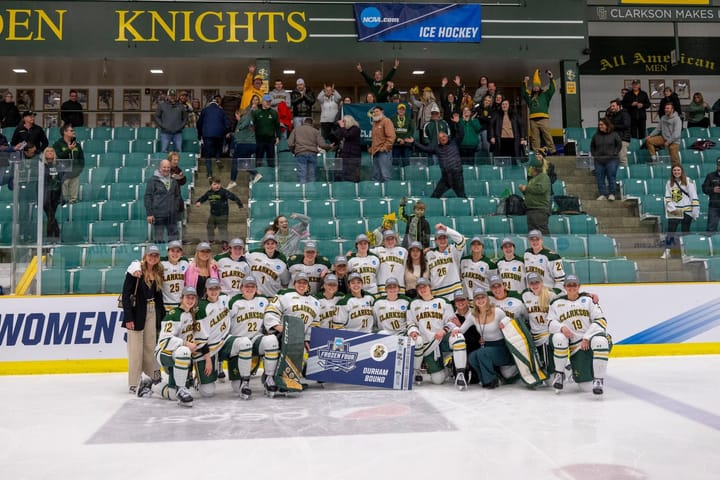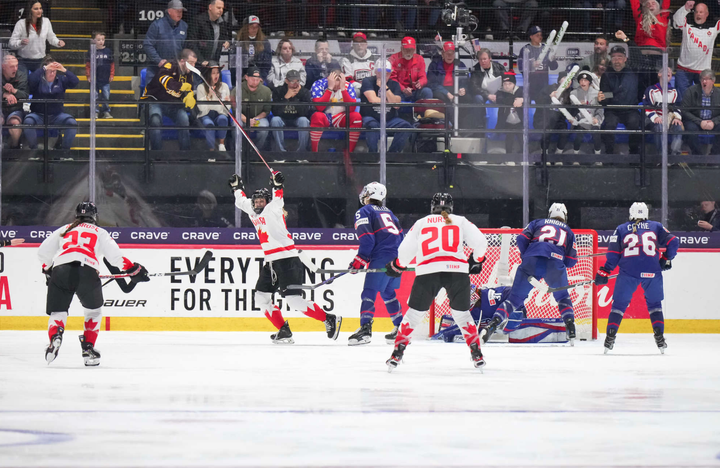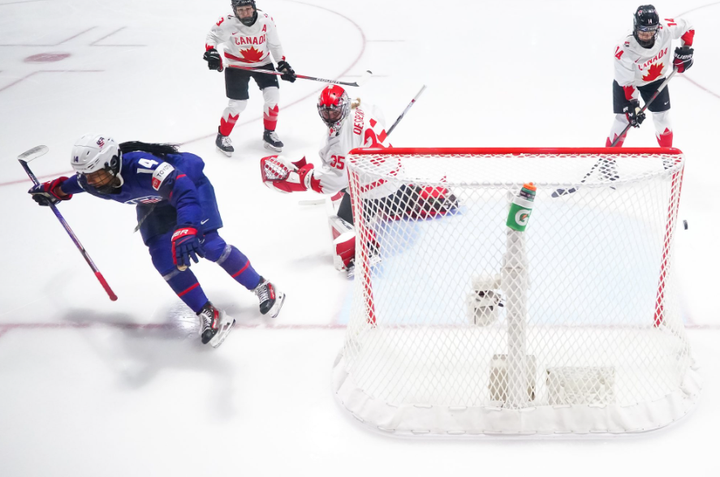What Meghan Duggan’s Career meant to me
It’s a lot bigger than just the hockey.
I have a confession to make: I didn’t grow up watching hockey. Not really.
I was born just north of Atlanta in the 90s. Yes, my family had season tickets to the Thrashers, and I went to games with my parents and my brothers, and I enjoyed them and maybe could even explain what an icing was, but it wasn’t my thing. In fact, I wasn’t really that into sports generally until high school, and I didn’t start watching women’s hockey until 2013. I had gotten really into women’s soccer for the 2012 Olympics and it seemed like a natural extension. I was bored over Christmas break, home alone a lot in the evenings, and the US Women’s National Team was playing pre-Olympic exhibition games against Canada where I could watch them. And just like that I got sucked in. I watched the Sochi gold medal game in the back of a creative writing class my freshman year of college. I left for the bathroom to cry when we lost. Robert Kahn wrote in The Boys of Summer that “...you may glory in a team triumphant, but you fall in love with a team in defeat.” This was that moment for me.
I vividly remember watching the captain, Meghan Duggan, consoling her teammates while they stood around and waited for their silver medals, watched Canada get their gold medals, trudged through the handshake line with tears in their eyes. I mean, it was brutal, but what I remember is the way that Duggan was a total pillar. She was gluing them all together. I had not really noticed her before the gold medal game, if I’m being honest, but I never lost track of her after that game. Between the goal she scored in the second period and the way that she propped her teammates up after the final whistle, you could tell immediately what kind of player and leader she was. Something about that really caught my attention.
A couple of years later I was finishing up my college degree with no idea what I wanted to actually do. I was going to graduate with a degree in playwriting, but I didn’t really want to work in theater. My dad had been telling me to go to law school since I could talk, but my brother was an attorney and it just didn’t really seem interesting to me. I took an internship working in the NWSL because I liked soccer and wanted to try something new. I liked it and considered my options for grad school in sports management, but that didn’t quite feel right either.
I went through the motions of taking the LSAT but I still hadn’t come to a real decision, which, if you know me, was very, very weird. I was still following women’s hockey closely, and my big senior year gift to myself was a trip to Detroit with my best friend to finally see the US team play live at World’s. As a fan in the South, it was a rare moment of opportunity for me to watch women’s hockey live, and it was propelling me through the trudge of my final semesters of college.
Then, on the Ides of March—yes, seriously—the team dropped a major news bomb: they were boycotting the World Championships.
My initial reaction was to be majorly bummed. This was the one thing I was looking forward to, the one little pocket of time where I wouldn’t have to worry about my honors thesis or making some kind of decision about my postgraduate career, a chance to see my best friend who lived several states away. That reaction didn’t last any longer than it took me to read an article about the situation. I became obsessed with the entire thing immediately. I talked about it to literally anyone who expressed a breadcrumb of interest. I read everything I could get my hands on, and eventually that led me to doing actual research about contracts and collective bargaining agreements, just to understand the dispute and how likely the team was to come out on top against the federation. I had taken two pre-law classes in undergrad but this was the first time I actually engaged with any kind of legal research in a way that meant something to me.
Years later, at Boston College in a labor law class, I found that I remembered a lot of what I had learned during that time, particularly what collective bargaining was and what it wasn’t, and what it meant to be an ‘employer’ or an ‘employee.’ That last point was a pivotal issue in the negotiations, because USA Hockey insisted the women weren’t employees, and that just sounded wrong to me. But I wanted to be able to explain why it was wrong. It was an argument I wanted them to win, and it was an argument that I wanted to win.
I can’t remember exactly when or where I was when the lightbulb went off, but at some point I realized, the people at the table during these negotiations are lawyers. The people who are helping players advocate for themselves are lawyers. It had never occurred to me that lawyers did things like that, or that I could do things like that. I had already applied to law schools and decided to go to one by March, but I had no idea why or what I was doing until the boycott happened. While they battled it out publicly and privately, things started to click into place for me. I could not believe how moved I was by the campaign. When I read that Meghan Duggan had personally called hundreds of players in the USA Hockey pool to implore them to stand together in collective action, I got genuinely emotional. I never stopped thinking about it. I have still not stopped thinking about it, and what it represents.
USWNT captain Meghan Duggan has made about 100 calls today to entire pool of women players in the national program. They're all united.
— Craig Custance (@CraigCustance) March 16, 2017
I wanted them to win that battle more than I wanted them to beat Canada right in front of my eyes. I was lucky enough to see both of those things happen. By now you all know that the team and their lawyers won a historic victory in convincing USA Hockey to start on the path of recognizing the work the women’s team puts in every day, and because I held on to hope that they would be able to, I was in Detroit, a few rows back from where Hilary Knight scored the game-winner in the gold medal game.
I went home and made my plans to move to Boston for law school, and for the first time it felt like a real decision I was making, and one that I could explain. I had plenty of classmates who didn’t know exactly why they were in law school or what they wanted to do. We’re all fine now and everyone figures it out eventually, but I knew from day one that labor and employment law was where my heart was set.
There was one quote from a USA Today article that just never left my brain. It’s a quote from Duggan, of course, at the end of March, after the end of the boycott and before the first game of the World Championships. This is what she said about the boycott and their success: “I think it shows girls and women within sport or without sport: Do more, be more, be better and put pressure on people.”
When I think about Meghan Duggan, I think of three things. The first is her goal in that second period of the gold-medal game in Sochi. The second is the story she’s told about sitting in a Dunkin’ individually calling players in the USA Hockey pool all the way from NCAA DI programs to DIII and ACHA players, compelling them to stand together. The third is that quote. For me, getting my law degree, pushing through countless obstacles to take an online bar exam during a pandemic, is all about that quote. Doing more, being more, being better, having an opportunity to put pressure on people. That’s what my degree is for: putting pressure on people. Pushing things forward, no matter how slow. Doing the hard things, because they pay off, and because other people will benefit from seeing you do them.
For every single one of us in women’s hockey that pushes one-half as hard for equality as Meghan Duggan pushed during her career, women’s sports takes a step forward. When I think about Meghan Duggan and what she’s meant to this sport, that’s what I think of: moving forward.





Comments ()